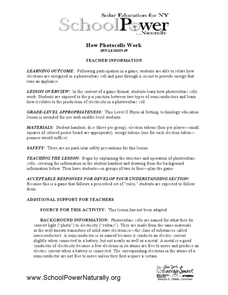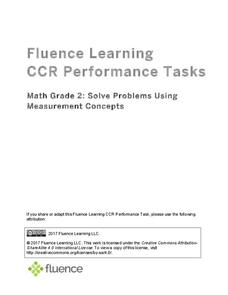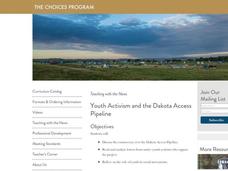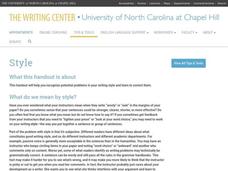Curated OER
What's Up With the Water Cycle?
Students explore the water cycle. Students identify the stages in a water cycle and create a PowerPoint presentation based on their knowledge.
Curated OER
When Disaster Strikes: Flooding in Pakistan
Young scholars complete various activities after reading about flooding in Pakistan. For this lesson on humanitarian efforts, students read about flooding that occurred in Pakistan, discuss what they have read, and synthesize the...
Curated OER
WET Science Lesson #11: How Light Affects Water
Scientists listen to the story of Wadja Egnankou who works to save African mangrove forests. They experiment with refraction and the introduction of particulate matter to water. They conclude with creative writing about the need for a...
Curated OER
There's a Volcano in my Backyard!
Students utilizing a volcanic hazard map of Mount Rainier, reach conclusions about the potential hazards of future eruptions. They create educational materials about these hazards and what to do if one erupts again in the future.
Curated OER
Alcoholic Fermentation in Yeast
Biology learners investigate the effect of sucrose concentration on yeast alcoholic fermentation. During the lesson,they compare and contrast the processes of cellular respiration and alcoholic fermentation. They design an experiment to...
Curated OER
Is the Moon out tonight?
Learners talk or read about the way the moon travels across the sky. They then look at the picture of where the moon is and draw where it will be in the picture, later in the evening. Note: The worksheet is intended for third or fourth...
Curated OER
How Photocells Work
Give small groups of physical scientists tokens that represent electrons in a photovoltaic cell. They play a dice game in which they move the tokens around, representing the flow of electrons through the p-n junction of a semiconductor...
Curated OER
What's Organic?
Students discuss background information presented by the teacher and read dictionary definitions for the words "organic" and "synthetic." In this gardengin lesson, students complete a worksheet on the material. Students grow and compare...
Curated OER
Working With Environmental Issues
Pupils consider the source of disease and parasites in West Africa. In this environmental issues instructional activity, students read "Working with Environmental Issues," by Fred Koehler. Pupils participate in an activity that requires...
Curated OER
Work and More Work
In this science worksheet, learners classify 6 actions as positive work, negative work, or no work. Students also design their own experiment.
Curated OER
Archaeological Detectives
Middle schoolers, in groups, examine in depth one aspect of forensic archaeology to determine the skeleton's age, gender, and possible cause of death. To do so, students must first explain what is involved in each aspect of forensic...
Curated OER
Gadget Anatomy
Sure to be a hit with your charges, here is a science lesson that has lots of hands-on activities packed into it. The focus is simple machines, and how they help us perform work. After a discussion and demonstration session, groups of...
Institute of Electrical and Electronics Engineers
Be a Scanning Probe Microscope
Extensive reading is done in order to learn about scanning probe microscopy and nanoscale. Afterward, individuals use a pencil to probe an unidentified object that is inside of a box so that they cannot see it. Using only what they could...
Kentucky School for the Deaf
Levels of Organization within an Ecosystem
From tiny organisms to entire biomes, young scientists examine the interdependent relationships tying all living and non-living things together with this collection of ecology resources.
Give and Let Live
Blood and Transplant: Blood
Why is blood donation so important, anyway? Science and health classes across multiple grades benefit from an in-depth look into the need for and process of blood donation. With an emphasis on presenting the topic in a non-threatening...
Fluence Learning
Solve Problems Using Measurement Concepts
Young mathematicians demonstrate what they know about measurement with a four-task assessment that focuses on estimation, length, and inches.
K12 Reader
Using Land in Different Ways
After reading about rural, urban, and suburban land use, readers respond to a series of comprehension questions using evidence from the provided passage.
University of Waikato
Estuary Metaphors
Mixing metaphors into science. To begin, the instructor leads a discussion about estuaries to determine what the class already knows. Working in small groups, pupils determine how a selected object is similar to an estuary, how it...
CK-12 Foundation
Microscopes: Focal Point
The 1590s saw the invention of the first compound microscope. Scholars learn about how microscopes work and how to properly focus one. The lesson stresses the science fields that use microscopes and the difference between electron...
Computer Science Unplugged
The Chocolate Factory–Human Interface Design
What is this? What is it for? How does it work? Challenge the class to think about to how to design a new chocolate factory for the Oompa-Loompas to make it easy to use. The activity is the first of a three-part series on...
Teach Engineering
Get the Word Out at McDonald's!
To get the word out that the Great Pacific garbage patch (GPGP) contains millions of pounds of non-biodegrading plastics, individuals research the GPGP and write an article for a newsletter. Researchers present their facts in a...
Virginia Department of Education
Passing Traits to Offspring
What makes each one of us unique? Lead your class in this exciting and educational activity as you uncover traits that show how each individual is different from another. Pupils explore facts about DNA technology and predict the...
Brown University
Youth Activism and the Dakota Access Pipeline
Do young people have a role in social movements? Should they? The involvement of young people in the Dakota Access Pipeline is the focus of a resource that asks class members to examine letters written by native youths who oppose the...
University of North Carolina
Style
Just like you choose your clothes to ensure they fit the occasion, you should choose your words deliberately while writing. Style, the main topic of one handout in a series on writing skills, involves choosing words carefully and paying...























